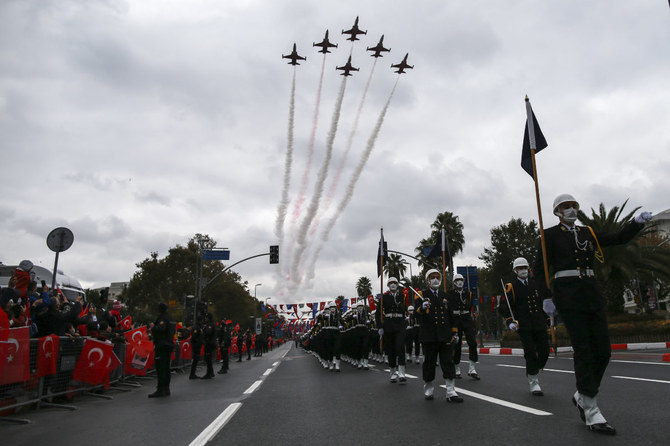Ahead of elections, military’s role becomes a key debate for Turkish parties

https://arab.news/bz9xz
In the past decade, foreign policy has become an integral part of Turkish political parties’ campaign rallies. The domestic political environment started to shape foreign policy orientation and, in turn, foreign policy also shaped domestic politics, thus serving as a medium of differentiation for political competitors.
Issues related to foreign policy are used by both ruling or opposition parties as a political strategy to consolidate and/or to construct domestic gains. This has caused foreign policy to become a major source of domestic polarization at home in Turkey. The latest example of this was the clash between the ruling and opposition parties over the mandate for cross-border operations in Syria and Iraq.
The Turkish parliament on Oct. 26 passed a motion that extended the military’s mandate to launch cross-border operations in Syria and Iraq for another two years. Previously, the motions to extend the deployment of troops to two neighboring countries were issued for renewal annually. However, the fact that this time it was extended for two years has caused controversy in the opposition ranks which question the intentions behind the government’s decision. This was not the only development that marked a first in the mandate issue. The country’s main opposition, the Republican People’s Party (CHP), voted against the motion, seeking a proper explanation by the government concerning the need for such a mandate. This marked the first time the CHP, which announced its decision just an hour before the General Assembly session, had voted against the measure ahead of the critical elections set for 2023.
“You don’t tell us what it is about. You say (it will be valid) for two years and tell us to vote for it. Why?” CHP leader Kemal Kilicdaroglu asked Turkish President Recep Tayyip Erdogan in an address to his party’s members in parliament. In 2003, the CHP voted against the deployment of Turkish forces in Iraq, standing in a similar stance to Erdogan. However at that time, both the domestic political environment and the party’s own foreign policy vision led to the decision.
The CHP, which has 135 deputies in the 583-seat parliament, voted in favor of the motion in previous years and a similar stance was expected by the party in last week’s session. However, Kilicdaroglu said several factors had caused the change in his party’s stance. Indeed, there are several driving forces behind the CHP’s position, mostly related to its election strategy for 2023; its changing foreign policy is also noteworthy. I mentioned previously in this column that the main opposition party has started to embrace a different foreign policy strategy and the CHP delegations’ recent visits to Irbil and Athens were a clear indication of this strategy.
It is not easy to understand how the ruling and opposition parties in Turkey shift their policies on security and foreign matters.
Sinem Cengiz
Despite the CHP’s opposition, the mandate passed in parliament with the votes of deputies of the ruling Justice and Development Party (AKP) with 287 seats, and the AKP’s main ally, the Nationalist Movement Party (MHP) with 48 seats. CHP’s ally — the IYI party — also voted in favor. In Turkey, usually foreign policy issues related to security garner the political parties’ support regardless of their ideological tendencies. The positions of political parties in various foreign policy matters and how such ideological stances matter in foreign and security policies have become an important matter for study. As a very common saying suggests, however, “Turkey is one of those countries where the more you know, the less you understand.” So, it is not easy to understand how the ruling and opposition parties in Turkey shift their policies on security and foreign matters.
In the past decade, the government has shifted its “defensive geopolitics” from strictly defined national interests at its core to “offensive geopolitics.” Thanks to these mandates, between 2016 and the present, Turkey launched four military operations in northern Syria with each operation having specific aims. Turkey also regularly conducts military operations in northern Iraq and, since 2006, has also had a separate writ to deploy troops in Lebanon as part of a UN peacekeeping force. Nonetheless, the mandate for Lebanon has not become an issue for debate as the ones regarding Syria and Iraq have.
The latest motion came amid rumors of a Turkish military offensive in northern Syria after two Turkish police officers were killed on Oct.7. Erdogan said that the attack was the final straw and that Ankara was determined to do whatever was necessary. While Turkey steps up preparations for a new operation in Syria, there have been reports stating that the top generals in charge of Turkey’s military operations in Syria have sought retirement, fueling questions over Ankara’s policies in Syria. A recent report stated that five generals serving on Syria-related missions were seeking to resign, including the head of a command center in charge of all Turkish operations in Syria. The reasons are that the military is drawn into the clamor of daily politics.
Since the establishment of the republic, the military has always had a crucial place in Turkish political life. However, in the past decade, it has played a significant role in the government’s military-based foreign policy. Thus, as several issues divide the ruling and opposition parties, the role of the military in foreign policy has also become a matter of divergence. This divergence has begun to show itself even further as the country approaches key elections in 2023.
• Sinem Cengiz is a Turkish political analyst who specializes in Turkey’s relations with the Middle East. Twitter: @SinemCngz









































